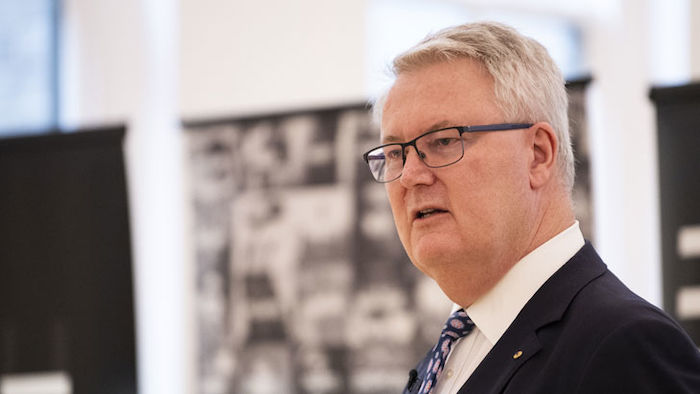What Simon Longstaff learnt about life from dolphin spotting
By Julia Newbould
Simon Longstaff is the executive director of the Ethics Centre, which he has led since 1980, helping navigate the question of ethics in politics banking, law and medicine. The latter was particularly pertinent at the outset of the COVID-19 pandemic.
What was your first job?
I finished school aged 16 and three days after my 17th birthday I started work as a cleaner and service attendant on Groote Eylandt at GemCo - then owned by BHP, now owned by South 32.
I was later moved to the safety department and trained in ambulance, fireman and health and safety duties in that remarkably remote part of Australia. I developed a kinship with the indigenous people and learnt valuable lessons about how to see the world. I only realised how deeply this affected my ethics a short while ago.
The Anindilyakwa people took me to the end of the wharf to teach me how to spot dolphins. They asked me to look into the water and look for dolphins. I couldn't see any. They explained that the problem lies in how I look at things. If you look at the pattern of the water with a dolphin and the pattern without a dolphin, you'll be able to recognise the pattern and see the dolphin.
Nearly everything I do with work now is about spotting patterns - in the military, hospitals and banks, I'm looking for patterns and how things work. My lesson at the end of the wharf has been guiding my thinking for decades without me realising how profound it had been at the time.
What's the best money advice you've ever been given?
Pay off your mortgage. I don't have a lot of investments, we live in an expensive city and we had help to get into property. The idea of the perpetual debt declining is like the nirvana at the end of the rainbow.
The other one would be about investing in life insurance when younger. Although I didn't make the investment at the level needed to protect the family - had I done so it would have paid the mortgage and school fees.
What's the best investment decision you've ever made?
I think the best investment decision I've made is buying a piece of software from Steinberg called Cubase (I now have Cubase Professional 10.5) and the MIDI hardware that comes with it. The keyboard looks like a piano and can sound like a cathedral organ, violin, cellos, drum kit and more.
I love music and am a self-taught musician and composer. There's nothing more sublime than sitting down and writing music to replicate things I've heard. There have been hours of enjoyment. I can play almost anything I hear on a keyboard and have a good ear for sonic structure - there's as much science as art in it.
I have an eclectic taste from hip hop through to classical - dubstep and techno as well as country and western. I can get absolutely hooked on things and sometimes it's just the engineering on it, from Tristan and Isolde and Elgar one moment to Dr Dre the next.
What's the worst investment decision you've ever made?
I'm not a person with any regrets. I learn from things all the time, even when they go bad.
What's your favourite thing to splurge on?
Haigh's chocolates, in particularly the Haigh's choc-caramels.
If you had $10,000 where would you invest it?
The Ethics Centre - I think it would do more good there.
If you really want to make a difference in this world you need to look deeper than the symptoms. A healthy society has to have strong ethical infrastructure and nearly all the things we find troubling in the world are due to cracks in that infrastructure. I wouldn't get a financial return from my $10,000 but I'd get impact.
What would you do if you only had $50 left in your bank account?
I'd get a second job!
Do you intend to leave an inheritance?
I'd like to be able to give my two children something that helps them enjoy the same quality of life I enjoy now - like having a house, which is so out of the reach nowadays.
I'd like to do that for them if I could but I wouldn't if it meant compromising the way my wife and I live now.
What's one of life's luxuries you couldn't live without?
I don't think I could do without books. I couldn't live without being able to read history and philosophy, and the product of minds other than my own.
Finish this sentence: money makes ...
... money. It doesn't guarantee happiness or health; it doesn't extend one's choices very far beyond living a flourishing life. What it does make is more of itself.
Get stories like this in our newsletters.



